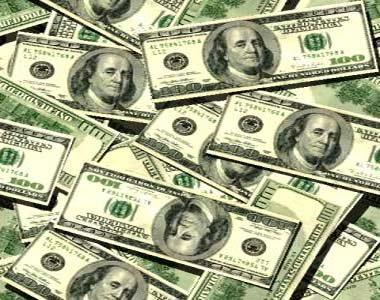
USDollar
By Les Leba
In October 2012, several media reports confirmed that two men were helping Economic and Financial Crimes Commission (EFCC) operatives with information on how they came about $986,000 found on them at Lagos and Kano International Airports respectively.
The duo, Nkem Sebastian and Alhaji Tasiu Kura, were apparently arrested in separate operations as they were about to board their flights to Dubai. Alhaji Kura was nabbed with the sum of $700,000 in Kano while Sebastian was arrested with $286,000 in Lagos.
“The two arrests, according to the reports, came barely 48 hours after the arrest of 24-year old Abubakar Tijani Sherif, whom EFCC described as a bulk money smuggler, with over $7 million at the Murtala Mohammed International Airport, Lagos, en route the United Arab Emirate.
“In a related report, the EFCC noted that “Globally, bulk cash smuggling is usually associated with proceeds of crime, where illegitimately earned funds are processed outside the banking system”. Incidentally, such arrests are not uncommon.
“In a statement on the 3rd of November 2010, the incumbent CBN Corporate Affairs Manager, Mohammed Abdulahi, noted that “CBN had been inundated with complaints from foreign countries that some Nigerian travellers indulge in cross boarder transportation of large sums of foreign currencies in cash, and that Nigerian Customs Service’s returns show that large amounts of up to $3 million cash had been taken out of Nigeria by individuals in single trips.” (See business Punch 4/11/2010, pg. 15).
“The more recent series of arrests confirm that currency smuggling and money laundering are still thriving businesses in Nigeria. However, CBN’s sanctimonious posturing may just have been a subtle form of image laundering for the apex bank, whose misguided policies liberally fund the foreign exchange sources for currency traffickers, smugglers and money launderers.
“The truth, of course, is that the huge sums of moneys trafficked were most certainly purchased from various BDCs, to which CBN regularly disburses hundreds of millions of dollars every month!
Indeed, liberal market dollar supply was one of the policy support instruments demanded by the IMF and the London and Paris Credit Clubs before Nigeria’s controversial debt exit, which fleeced over $12bn from our tattered pockets in 2006, in the name of debt forgiveness.
“Our monetary authorities had cleverly put a positive spin on this IMF conditionality, by suggesting that such free dollar supply would reduce the existing huge gap between the official and the black market rates of exchange.
Although the black market and the official rates are much closer, some analysts believe that the liberal supply of public sector dollars to BDCs for better exchange rate management may, in reality, be akin to smashing a cockroach on a glass table with a sledge hammer, when a less destructive repellant or insecticide could have been applied.
“Incidentally, the difference between official and black market exchange rates continue to be between N5 and N10, a margin, which is still attractive enough to encourage underhand practices in the banks. In successful economies everywhere, it would be apocryphal for public sector dollars to be liberally sold to BDCs, whose cash flows are traditionally derived from the itinerant tourist market.
“The recent EFCC arrests suggest that BDCs may have graduated from merely meeting the retail requirements of travellers to becoming hard-core suppliers of foreign exchange to major money launderers and smugglers! In other words, CBN’s ill-advised liberal dollar allocations have become a supportive tool for national economic sabotage.
For example, the near collapse of our industrial landscape is partly the result of the black market forex funding of imports of contrabands from aggressive industrial economies.
“Similarly, the motivation for money laundering and currency trafficking is facilitated by free access to public sector dollars made available to BDCs by CBN. Ultimately, the adoption of IMF’s conditionality on liberal dollar supply to BDCs has evidently done much harm to the economy.
This much was made evident in the past, in several of our articles in this regard, see for example, “Banks and Money Laundering”, September 2009 and “Funding Smuggling and Money Laundering from BDCs”, August 2011 at www.lesleba.com.”
Regrettably, however, despite the return to RDAS, forex demand still remained untamed. Consequently, in the latter part of 2013, the CBN announced the reduction of its weekly allocation of forex to BDCs from $1m to $250,000.
Expectedly, this measure only instigated dollar scarcity, with attendant naira exchange rate depreciation, as a margin of over N20/$1 soon evolved between official and black market rates.
Furthermore, in a clear demonstration that the CBN did not thoroughly think through its strategy, only a few months later, in January 2014, the apex bank in another rash policy somersault lifted the $250,000 limit on forex sales to BDCs, and instead, directed banks to sell forex on demand to BDCs, so as to increase the dollar supply, and reduce the margin between the official and black market rates, without minding the antisocial threat of money laundering, bulk money trafficking or capital flight.
Conversely, the EFCC Chairman, Ibrahim Lamorde, only last week, at a press interview in January, identified BDCs as major conduits for funding bulk currency movements, which obliterate the tracks of huge funds stolen from the treasury. Lamorde therefore, passionately pleaded with banks to be more circumspect, and to also, thoroughly document their forex sales to BDCs, so as to facilitate investigations of corrupt practices. Lamordes’ pleas would certainly have been more appropriately directed to the CBN, which is obviously the primary source of easy dollar supply in the system.
Nonetheless, the truth, of course, is that the naira will become appropriately priced with minimal variations in market rates, when CBN refrains from creating excess or surplus naira against rationed dollar supply in the market, when it constantly unilaterally substitutes naira supplies allocations instead of the adoption of dollar certificates, for payment of dollar-derived revenue.
Disclaimer
Comments expressed here do not reflect the opinions of Vanguard newspapers or any employee thereof.